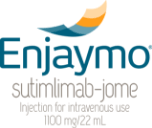ENJAYMO coverage and
reimbursement
Recordati Rare Diseases is committed to helping ensure all patients with Cold Agglutinin Disease (CAD) have access to treatment with ENJAYMO
Information about coverage and reimbursement will help guide you in obtaining coverage for your patients.*
*The codes referenced in this document may be used to communicate services rendered when filing claims for ENJAYMO. These codes are being provided for informational purposes only and should be verified, as codes may change. The provision of billing codes does not constitute reimbursement or legal advice. Providers are solely responsible for ensuring the accuracy of billing submissions to any payer.

The ICD-10-CM diagnosis code for cold autoimmune hemolytic anemia (CAD) is D59.12.1
| ICD-10-CM Code | |
|---|---|
| D55-D59 | Hemolytic anemias |
| D59 | Acquired hemolytic anemias |
| D59.1 | Other autoimmune hemolytic anemias |
| D59.12 | Cold autoimmune hemolytic anemia† |
†ICD-10 code D59.12 can also be referred to as chronic cold hemagglutinin disease, Cold Agglutinin Disease, cold agglutinin hemoglobinuria, Cold type (primary) (secondary) (symptomatic) autoimmune hemolytic anemia, and cold type autoimmune hemolytic disease.
ENJAYMO has a 10-digit NDC code displayed on its packaging. In most cases, this should be converted to an 11-digit NDC code for billing purposes.2 As of September 1, 2025, Recordati Rare Diseases has announced a new NDC code listed below. Please use the new NDC below to order ENJAYMO.
| 10-digit NDC | 55292-820-01 |
| 11-digit NDC | 55292-0820-01 |
| How supplied | One 1100 mg/22 mL (50 mg/mL) single dose vial per carton3 |
For reimbursement purposes, please align either the old or new NDC code on the ENJAYMO carton to the reimbursement form. Payer requirements for NDC use and format may vary. Please contact each payer for specific coding policies.
CPT® codes are used to describe the procedures that may be performed on a patient and/or how a drug or supply being billed was administered.4 CPT® codes commonly associated with the administration of IV-infused monoclonal antibodies such as ENJAYMO are listed below. Confirm preferred coding policy with payer prior to administration whenever possible.
| Primary | |
|---|---|
| 96365 | Intravenous infusion, for therapy, prophylaxis, or diagnosis (specify substance or drug); initial; up to 1 hour |
| 96366 | Each additional hour (list separately in addition to code for primary procedure; report 96366 for infusion intervals of greater than 30 minutes beyond 1-hour increments)‡ |
‡Per CMS guidelines, if the incremental amount of infusion time is 30 minutes or less, the time is not to be billed separately. Note that some payers may require reporting the actual number of minutes on the claim.
CPT® is a registered trademark of the American Medical Association.
HCPCS codes are assigned by CMS and are used by Medicare and most private payers to describe products administered in a physician's office or hospital setting.5 As part of the standardized Level II HCPCS coding system, ENJAYMO has been issued a permanent J code, which went into effect October 1, 2022, and is listed below. All claims made October 1 should utilize the permanent J code to facilitate reimbursement.
Note that utilization of the permanent J code does not impact the ability of ENJAYMO to maintain transitional pass-through payment status under the Medicare Hospital Outpatient Prospective Payment System (OPPS). As always, the coding system is not a methodology for making coverage or payment determinations. The existence of HCPCS codes does not imply coverage; it implies only that the product may be reimbursed if covered. Coding should be verified with each patient's health plan prior to submitting a claim.
| Permanent J Code | Description |
|---|---|
| J1302 | Intravenous injection, sutimlimab-jome, 10 mg |
The permanent J code replaces all temporary codes and should be used for both inpatient and outpatient billing as of October 1, 2022.
JW modifier: Providers and suppliers are required to report the JW modifier on Part B drug claims for discarded drugs and biologicals. Also, providers and suppliers must document the amount of discarded drugs or biologicals in Medicare beneficiaries’ medical records.6
Because ENJAYMO can be administered in various settings (infusion center, physician's office, patient's home if deemed clinically appropriate by the prescribing physician), it is important to populate a claim with the appropriate 2-digit place-of-service (POS) code.7 Always verify the preferred POS codes for your patient's health plan before submitting a claim.
Reimbursement considerations
ENJAYMO is designed to be prepared and administered by a healthcare provider. The drug costs are expected to be covered under the Medicare Part B benefit. Please refer to the individual patient’s plan to determine any applicable coverage requirements. The specifics of coverage may vary by payer.
When filing a claim
It is recommended that ENJAYMO coverage be confirmed with all payers prior to patient administration, as patient benefits vary among payers and by plans.
Some payers also have policies that may affect coverage for ENJAYMO. These include:
- Site of care: Some payers may have coverage rules that restrict certain providers from delivering infusion therapies
- Network providers: Some payers have exclusive contracts with in-network or participating providers to provide infusion therapies. These may include contracts for coverage in physician offices and outpatient settings or to specialty pharmacies that provide drugs and biologics to the provider
- Prior authorization: Many plans may require providers to obtain prior authorization (eg, medical necessity) to begin a course of treatment. Check with the payer to determine their process, requirements, and method for requesting authorization
Documenting necessity
As a new medication used to treat a rare disease, some insurers may not be familiar with ENJAYMO. These insurers may require additional documentation to process either a prior authorization or a claim upon receipt.
Documentation that may be required includes:
Details on the patient’s case history, previous therapy, and clinical course




